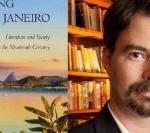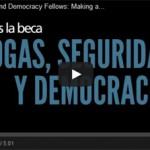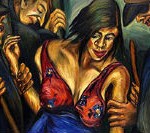January 2024
Marina Lemle and Vivian Mannheimer| HCS-Manguinhos Blog

Artwork of Fernando Vasconcelos for the picture in the article The Cabinet of Curiosities at the University of Coimbra: a museological and scientific initiative
In 2023, the journal História, Ciências, Saúde – Manguinhos changed its form of publication: instead of launching the traditional four annual issues, in addition to one or two thematic issues, it adopted the continuous publication system (also known as a continuous stream of publication). This system consists of the electronic publication of the journal’s articles, isolated or in small groups, as soon as they are approved and internally processed (linguistic revision, normalization, layout) instead of publishing all articles of an issue at once.
We changed routines and took a bit of beating, but we are very happy with the result. All articles scheduled for volume 30 were published in Scielo Portal in 2023, including the content of two supplements – one on Covid-19 in Latin America and the most recent on Fiocruz’s historical heritage. The journal no longer has four annual editions and now has a single yearly edition, constantly updated with new content.
These articles are part of the last update of volume 30 of HCS-Manguinhos:
The Cabinet of Curiosities at the University of Coimbra
The final batch of articles published in HCS-Manguinhos presents the research notes The Cabinet of Curiosities at the University of Coimbra: a museological and scientific initiative, by João Brigola, Professor of the University of Evora, and Paulo Trincão, director of Museu da Ciência, at University of Coimbra, Portugal. According to the article, cabinets of curiosities, also known as wonder rooms, were the origin of modern museums. The Italian naturalist Domingos Vandelli was contracted as an instructor for the new course in natural philosophy at the University of Coimbra (1772) and brought objects from his cabinet in Padua; he combined these with another collection mounted in Portugal (1764-1768). Based on descriptions of these two collections, the article defends the important initiative underway at the Cabinet of Curiosities at the University of Coimbra’s Museum of Science, which was inaugurated in May 2022.
Anthropocene, human sciences and historiography
The last batch of texts published in volume 30 of HCS-Manguinhos also includes the article Anthropocene, human sciences and historiography, by Walter Francisco Figueiredo Lowande, Professor of the Department of History at Universidade Federal de Alfenas, Minas Gerais. The article presents the increasing move of discussions about the Anthropocene towards humanities and social sciences. It discusses how some works produced in humanities and social sciences have dealt with the relationship between causes, effects, and consequences regarding the new planetary regime.
Campaigns against Hansen’s disease during the second half of the twentieth century
Carla Lisboa Porto and Maria Cristina da C. Marques, from the Faculty of Public Health at the University of São Paulo (USP), are the authors of Socio-historical Representations of a disease: a study of posters from campaigns against Hansen’s disease during the second half of the twentieth century. In the context of educational campaigns to combat Hansen’s disease, the article analyses posters from the 1950s, 1960s, 1980s, and 1990s, seeking to identify the textual, visual, or graphic elements used to develop a discourse on this disease and those it affected and transformations and permanences in this discourse, as well as to verify how they became part of a narrative of institutional memory linked to public health in the state of São Paulo. The sources studied are part of the Health Campaign Posters collection, whose items were produced by several institutions linked to public health and are part of the Emílio Ribas Public Health Museum collection.
Interactive experiences in museums
In the article Interactive and conversational experiences of visiting families in “Darwin, the exhibition, exploring species,” at the Museo Trompo Mágico, Mexico, the coordinator of the National Institute of Public Communication of Science and Technology (INCT-CPCT, Fiocruz) Luisa Massarani, the professor at the National Autonomous University of Mexico Ana Claudia Nepote and the INCT-CPCT researchers Jessica B. Carneiro, Bruna Ibanés Aguiar and Graziele Scalfi analyze the conversational content and interactions of ten families to understand the learning experience of families in a scientific exhibition. The results show that the families actively participated in the exhibition, observing and talking about the animals, asking questions, looking for answers, and elaborating explanations based on scientific thinking.
The arts of healing in modern Argentina
Finally, it is also available at Scielo the review by Astrid Dahhur, from the Pontifical Catholic University of Argentina, about the book Sanadores, parteras, curanderos y médicas: las artes de curar en la Argentina moderna, organized by Diego Armus, professor at the Swarthmore College.









